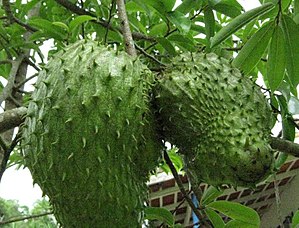Note: This is a project under development. The articles on this wiki are just being initiated and broadly incomplete. You can Help creating new pages.
Difference between revisions of "Annona Muricata"
(→Common names) |
(→Common names) |
||
| Line 12: | Line 12: | ||
==Common names== | ==Common names== | ||
| − | {{Common names|sa=|en=|gu=|hi=|kn=Mullu Ramphala|ks=|ml=|mr=|pa=|ta=|te=|en= | + | {{Common names|sa=|en=|gu=|hi=|kn=Mullu Ramphala|ks=|ml=|mr=|pa=|ta=|te=|en=Soursop}} |
==Properties== | ==Properties== | ||
Revision as of 12:30, 5 June 2023
Annona muricata is a fast-growing, small, evergreen tree. It can reach a height of about 7 metres. The bole can be up to 15cm in diameter. The tree is widely cultivated in tropical regions for its edible fruit.
Contents
- 1 Uses
- 2 Parts Used
- 3 Chemical Composition
- 4 Common names
- 5 Properties
- 6 Habit
- 7 Identification
- 8 List of Ayurvedic medicine in which the herb is used
- 9 Where to get the saplings
- 10 Mode of Propagation
- 11 How to plant/cultivate
- 12 Commonly seen growing in areas
- 13 Photo Gallery
- 14 References
- 15 External Links
Uses
Distension, Dyspepsia, Scabies, Skin diseases, Rheumatism, Coughs, Colds, Digestive tract ailments, Relieve fatigue, Maturate boils, Abscesses, Nervous shock, Bedwetting.
Parts Used
Fruit, Young shoot, Leaf.
Chemical Composition
The plant contains isoquinoline alkaloids including reticuline. The seed contains galactomannan, sitosterol, stigmasterol and cholesterol[1]
Common names
| Language | Common name |
|---|---|
| Kannada | Mullu Ramphala |
| Hindi | |
| Malayalam | |
| Tamil | |
| Telugu | |
| Marathi | |
| Gujarathi | |
| Punjabi | |
| Kashmiri | |
| Sanskrit | |
| English | Soursop |
Properties
Reference: Dravya - Substance, Rasa - Taste, Guna - Qualities, Veerya - Potency, Vipaka - Post-digesion effect, Karma - Pharmacological activity, Prabhava - Therepeutics.
Dravya
Rasa
Guna
Veerya
Vipaka
Karma
Prabhava
Habit
Identification
Leaf
| Kind | Shape | Feature |
|---|---|---|
Flower
| Type | Size | Color and composition | Stamen | More information |
|---|---|---|---|---|
| Flowering season is July to January |
Fruit
| Type | Size | Mass | Appearance | Seeds | More information |
|---|---|---|---|---|---|
| Fruiting season is July to January |
Other features
List of Ayurvedic medicine in which the herb is used
Where to get the saplings
Mode of Propagation
How to plant/cultivate
Grows best in the moist, humid tropical and subtropical lowlands at elevations up to about 1,000 metres. It prefers a mean annual temperature in the range 25 - 30°c with a mean annual rainfall over 1,000mm.[3]
Commonly seen growing in areas
Found on coastal limestone, Lowland woodland.
Photo Gallery
References
External Links
- Pages using duplicate arguments in template calls
- Pages that are stubs
- Ayurvedic Herbs known to be helpful to treat Distension
- Ayurvedic Herbs known to be helpful to treat Dyspepsia
- Ayurvedic Herbs known to be helpful to treat Scabies
- Ayurvedic Herbs known to be helpful to treat Skin diseases
- Ayurvedic Herbs known to be helpful to treat Rheumatism
- Ayurvedic Herbs known to be helpful to treat Coughs
- Ayurvedic Herbs known to be helpful to treat Colds
- Ayurvedic Herbs known to be helpful to treat Digestive tract ailments
- Ayurvedic Herbs known to be helpful to treat Relieve fatigue
- Ayurvedic Herbs known to be helpful to treat Maturate boils
- Ayurvedic Herbs known to be helpful to treat Abscesses
- Ayurvedic Herbs known to be helpful to treat Nervous shock
- Ayurvedic Herbs known to be helpful to treat Bedwetting
- Herbs with Fruit used in medicine
- Herbs with Young shoot used in medicine
- Herbs with Leaf used in medicine
- Herbs with common name in Kannada
- Herbs with common name in English
- Habit - Evergreen Tree
- Index of Plants which can be propagated by Seed
- Index of Plants which can be propagated by Semi ripe cutting
- Herbs that are commonly seen in the region of Found on coastal limestone
- Herbs that are commonly seen in the region of Lowland woodland
- Ayurvedic Medicine
- Pages without herbs images






